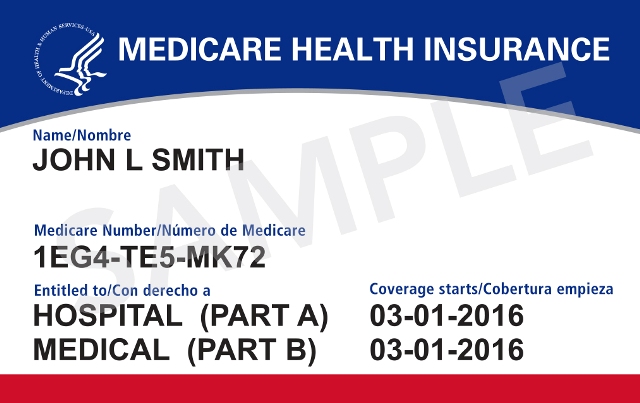
After a small delay, new Medicare cards began making the rounds in 2018. These came about as the result of changes made to combat identity theft, which was a threat thanks to the inclusion of Social Security Numbers as Medicare numbers.
Now, there are new Medicare identifiers that use 11 characters – both numbers and letters.
These cards are designed to be safer, but that hasn’t stopped fraudsters from coming up with ways to create trouble around the new cards. Be aware of calls asking for a “fee” to mail out new Medicare cards or provide additional services. Medicare does not provide unsolicited phone calls. The card is free and additional personal information is not required in order to get a new one.
What Stayed the Same on the Medicare Cards?
First, the new card is still red, white and blue.
Those automatically enrolled will still get their cards in the mail three months prior to their 65th birthday or 25th month of receiving disability benefits.
And the new Medicare cards still illustrate what type of insurance the carrier has, whether it’s Part A or Part B or both types. It shows the start date of coverage, too, as pertains to both parts of coverage and therefore provides a complete informational snapshot of what doctors, hospitals and other medical professionals need to see when establishing a coverage relationship.
What Changes Have Been Made to the New Medicare Cards?
The first and most notable change is that 11-character identifier. These numbers are randomly assigned and have no connection to the recipient’s personal data. Any connection to birthdays, other important numbers and other factors is purely coincidental.
This new Medicare number should only be provided to doctors, hospitals, insurers, health care providers, and trusted individuals that work with Medicare. It is a unique number and is informational in nature, which means care must be taken to protect it. At the same time, the randomly-generated number helps to better protect the identity of users.
The new card is made of paper, which is more cost-effective and easier for providers to work with.
The new card does not feature any information about the recipient’s gender or signature or any other potentially compromising data.
Other Important Information
New enrollees of Medicare will receive the new card automatically, regardless of where they live.
For the rest of the Medicare recipients, there is a rollout of the cards that will take some time. Information on specifics can be found at the MyMedicare.gov website. From there, users can cross-references their states and determine exactly when the new Medicare cards are set to arrive. The good news is that all cards are expected to be released by April of 2019.
The old cards will be phased out entirely and no longer accepted by doctors or hospitals by December 31 of 2019. Once new cards are received, users should begin to carry them immediately to appointments and old cards should be destroyed securely. Many agencies recommend the use of a shredder to get rid of old cards, as any identifying information should be kept from the wrong hands.
Users in a Medicare Advantage Plan, like an HMO for instance, will keep their typical Medicare Advantage Plan identification card. This continues to be the main card for Medicare for those clients. The same goes for Medicare drug plan cards. The new cards should be used along with those other cards, so be sure to keep all current Medicare-related cards handy.
As is always the case, scammers and fraudsters know the ins and outs. Reports have already emerged about the new cards, as criminals attempt to obtain information and money. As mentioned, Medicare does not proceed with unsolicited calls and will not contact recipients without express consent.
There are no fees for the new card. Private and personal information is never collected over the phone to obtain another card. Health benefits will never be annulled because users did not provide certain pieces of information.
Recipients who believe they have been targeted by a scam should contact 1-800-MEDICARE.
Replacement cards can be obtained by logging on to MyMedicare.gov and printing off a new card or by calling 1-800-MEDICARE. If recipients believe someone else is using their Medicare card, contact Medicare immediately.



